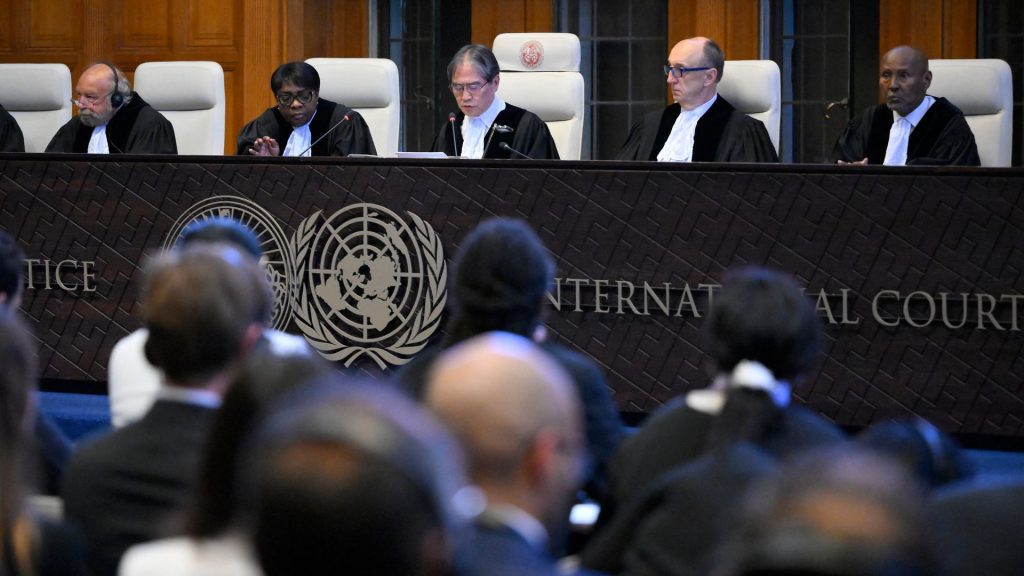Wealthy countries may have to pay up over climate change

The International Court of Justice ruled that countries could be in violation of international law if they do not do a better job of protecting the planet from climate change. The advisory opinion also said nations harmed the most by climate change could be entitled to reparations from wealthier countries.
ICJ ruling
“Failure of a state to take appropriate action to protect the climate system … may constitute an internationally wrongful act,” court President Yuji Iwasawa said during the hearing covered by the Associated Press.
This ruling means climate change activists could bring lawsuits against their own countries for failing to comply with the court’s decision.
“The true significance of the finding is that domestic courts do have the ability to issue binding decisions on their countries and on companies within their countries,” Michael Gerrard, professor and director of the Sabin Center for Climate Change Law at Columbia Law School, told Straight Arrow News. “The decision today is just an advisory opinion, but it empowers domestic courts and the advocates before domestic courts to do much more.”
The court’s ruling urges major polluters to meet and maintain the standards set in the 2015 Paris Agreement, an international treaty on climate change adopted by 195 parties.
President Donald Trump withdrew the U.S. from the agreement in each of his two terms.
“Every developed country has emissions that are higher than what would be needed to achieve the objectives of the Paris Climate Agreement,” Gerrard said. “We are way behind, and the International Court of Justice agreement does add to the legal tools for groups within countries to press their countries to do more.”
China is by far the world’s top polluter, but the U.S. is second on that list. With this ICJ ruling, China, the United States and other countries may be compelled to provide financial assistance to countries like the Pacific Island nation of Vanuatu.
Activists from Vanuatu led this court case and celebrated the victory.
“This advisory opinion is a tool for climate justice. And boy, has the ICJ given us a strong tool to carry on the fight for climate justice,” Vishal Prasad, a law student who lobbied Vanuatu to bring the case, told Reuters.
Other outlets have reported this ruling will allow countries to file lawsuits against each other, but Gerrard says that is not the case.
Impact on America
The U.S. under the Trump administration has become less inclined to adopt policies focused on climate change, meaning this ruling may not have as significant an impact on the United States.
“The U.S. courts have tended not to follow decisions by international tribunals in this kind of case,” Gerrard said. “So, it has limited direct effect on the U.S. It will affect the operations abroad of U.S. companies if they’re in countries that are acting on the ruling. It puts some diplomatic pressure on the U.S. to do more, but the current administration doesn’t seem to care about that.”
The White House gave The Associated Press its reaction to the ruling.
“As always, President Trump and the entire administration is committed to putting America first and prioritizing the interests of everyday Americans,” White House spokesman Taylor Rogers said.
The administration is currently drafting a measure that would revoke the federal government’s power to regulate greenhouse-gas emissions and combat climate change, making it harder to access climate change data.
What happens next?
What happens next will be up to each country to take further action on climate change.
“The ICJ’s advisory opinion reinforces that states have legal duties to act,” Joana Setzer, Associate Professor at the Grantham Research Institute on Climate Change & the Environment, told Straight Arrow News. “By anchoring these obligations in both human rights law and scientific consensus, the Court affirms that governments must cut their own emissions and ensure companies follow suit. This lays a strong legal foundation for holding states and major emitters accountable in future litigation.”
For several years, activists have filed lawsuits against their own governments over climate change.
Famed climate activist Greta Thunberg joined hundreds of others in a lawsuit against her native Sweden over climate change, but the country’s top court rejected the suit.
A group of Swiss women successfully brought a lawsuit against their government, claiming that the government had violated human rights by failing to take sufficient action to curb climate change.
“The International Court of Justice ruled that climate change is a grave threat and that none of the other important human rights, to life, right to food, right to many other things, can be realized unless we have a stable climate system. And therefore, it’s the obligation of every country to fight climate change,” Gerrard said.
Domestically, Hawaii recently settled a lawsuit with 13 young people who alleged the state didn’t do enough to reduce greenhouse gas emissions. The settlement included requirements that the state take specific action to do so, even if it forced them to raise taxes to execute the settled case.
The next United Nations climate conference is set for November in Belém, Brazil. Brazil also ranks in the top ten of worldwide polluters.





